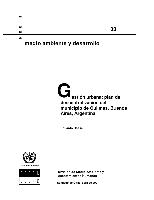Decentralisation and forest management in Kapuas district, Central Kalimantan
This case study discusses decentralisation and forest management in Kapuas district, Central Kalimantan, focusing specifically on the impact of these administrative reforms on timber concessions operating there. It is based on field research carried out during June and July 2000. The study is based on interviews with government officials, forestry department staff, university researchers, NGO workers and the employees of timber workers in the provincial capital, Palangkaraya, and the district capital, Kuala Kapuas.
Decentralisation of administration, policy making and forest management in Ketapang district, West Kalimantan
This study examines the preliminary impacts of Indonesia's decentralization process on the administration and management of forest resources in Ketapang District, West Kalimantan. The case study is based on field work carried out in mid-2000, using a rapid appraisal methodology. The report covers the impacts of decentralization in three areas, in particular: customary adat communities, oil palm and rubber plantations, and conservation issues related to Gunung Palang National Park.
Decentralisation of policies affecting forests and estate crops in Kutawaringin Timur district, Central Kalimantan
Kotawaringin Timur district lies within the Dayak heartland of Central Borneo, Indonesia. Prior to the late 1960s, most of the district was covered in dense tropical forest. However, these forests have been increasingly exploited since the 1970s when former-president Soeharto granted large timber concessions to logging companies in the area. Although Kotawaringin Timur’s forests still supply 49 percent of Central Kalimantan’s log production and half of its sawn timber and moulding, its forest resources are close to being exhausted.
Decentralisation, local communities and forest management in Barito Selatan district, Central Kalimantan
Based on field research carried out in Central Kalimantan during June and July 2000, this chapter examines the likely impact of the decentralisation reforms on forest management in Barito Selatan. Conclusions are derived from three major sources. First, interviews were conducted with key government officials and community figures in the provincial capital, Palangkaraya, and the district capital, Buntok. These were supplemented with information from relevant newspaper and government reports.
The effects of Indonesia's decentralisation on forests and estate crops: case study of Riau province, the original districts of Kampar and Indragiri Hulu
This study focuses on the impacts of decentralisation on forests and estate crops in the original districts of Kampar and Indragiri Hulu, located in Riau Province, Sumatra, Indonesia. The research was conducted during 2000, preceding the beginnings of decentralisation in January 2001, with a brief follow-up to March of that year. It was important to chart attitudes to decentralisation at provincial level, as well as examine the deconcentration of the regional office of the Jakarta-based Ministry of Forestry and Estate Crops.
The impacts of decentralisation on forests and forest-dependent communities in Malinau district, East Kalimantan
Malinau District, established through partition in 1999, is the largest district in East Kalimantan and contains some of its largest tracts of forest. With decentralization, the district has sought to generate revenues from its forests, but these efforts have been handicapped by a concurrent lack of institutional capacities to manage rapid forest exploitation and conflicts over claims. Timber extraction and utilization permits (Izin Pemungutan dan Pemanfaatan Kayu or IPPK) have been the main instrument for revenue generation, with 39 IPPK covering 56,000 ha.
The organizational structures for community-based natural resources management in Southern Africa
Throughout Southern Africa there has been a move to decentralize natural resource management (NRM). Decentralization has taken many forms, resulting in different organizational structures for NRM. Fourteen case studies from eight countries can be classed into four types, depending on the key organizations for NRM: (1) district-level organizations; (2) village organizations supported by sectoral departments (e.g. Village Forest Committees); (3) organizations or authorities outside the state hierarchy (e.g.
Mapping traditional structures in decentralisation policies: illustrations from three countries in Sub-Saharan Africa and the Near East
Information is provided on why to involve traditional leaders in the decentralisation and restructuring process. The extent to which this may be happening anyhow (by default) is part of the research hypotheses that guided fieldwork, which have not found to be relevant in all countries.
Gestión urbana: plan de descentralización del municipio de Quilmes: Buenos Aires, Argentina
La desconcentración y descentralización municipal se ha transformado en una necesidad urgente de los gobiernos locales en los países de la región. Sus objetivos son el mejorar la eficacia en la prestación de los servicios municipales, la participación de la población en el diseño, implementación y control de las políticas públicas y la búsqueda de mayores niveles de eficiencia, tanto de la inversión pública como privada.
Human resources in agricultural and rural development
Municipios Argentinos Fortalezas y debilidades de su diseño institucional
La globalización y la localización, entendidas como la integración a la economíamundial y la crecienda demanda de autonomía local, son identificadas como las dosfuerzas que, en la actualidad, más influyen en la forma que adopta el desarrollo en cadasociedad (The World Bank, 1999) Las ciudades adquieren indiscutiblemente un nuevoprotagonismo, con una tendencia cada vez mayor a que sean centro de decisiones, deestrategias propias, de políticas innovadoras, artífices de relaciones comerciales punto apunto sin intermediación de jurisdicciones provinciales o nacionales (Batley, 1998;Daughters, 1




